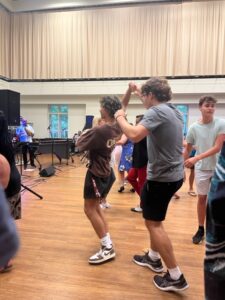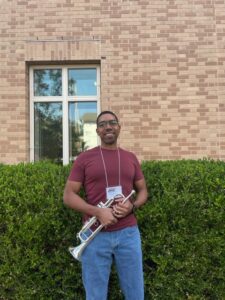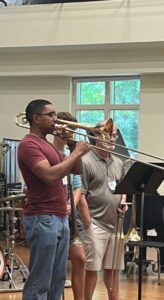Jazz is significantly cooler than I thought it was
Going into the workshop, I never found myself gravitating toward jazz as a music genre. I primarily chose to take this class for the journalism section and to see how I could expand my knowledge of music. The nightly concerts were amazing, but the daily jam sessions were what truly made me realize how fun jazz is.
Watching students from middle school all the way through adulthood get up and improvise together was incredible. Seeing the wheels turn in someone’s mind as they began a new sequence of runs or blared out the highest note their instrument could offer was awesome to witness.
I may take my friend up on learning how to dance
Thursday evening of the workshop, the Tito Puente Tribute Latin Dance Night took place in Kenan Music Building. Prior to the concert, Norberto “Betto” Herrera gave a salsa dancing lesson to students. I cannot remember the last time I had this much fun, and the beauty of salsa dancing is how versatile it is. All you need is a fun rhythm, and there are so many ways you can move your feet. Shoutout to my friend on UNC’s Ballroom Dance Team – he keeps telling me to come to their events, and it looks like I may have to.

Music brings people together like nothing else
This is a lesson I already knew, but it was only emphasized further throughout my time at the workshop. Speaking to performers and learning their stories through the journalism and jazz history section was incredibly rewarding. Hearing how best friends were formed, lifelong dreams were held, and families were built because of music is the coolest thing in the world.
In the journalism section, we were given the assignment of interviewing a member of the workshop for a profile piece. I chose performer Samuel Edoho-Eket, primarily because I thought it was fascinating how he played so many different instruments. Through speaking with him, I learned so much more about jazz’s influence on his life, including his close friendship with Roland and Rahsaan Barber, two of the faculty members at the workshop.
Jazz is all about communication, and it’s such a supportive activity
Watching the nightly concerts, jam sessions, and group lessons taught me a great deal about how much communication goes into jazz. Especially when there’s a lot of improvisation taking place, performers are constantly watching each other, counting, and signaling who’s going to play and when.
With this, I can’t recall a time and place where I saw more support and encouragement than watching jazz musicians play together. There are constant smiles, high-fives, and faces of pure awe after someone finishes a solo. Everyone is just so eager to learn from each other, and it’s beautiful to see.

